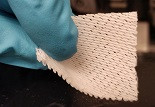The aim of this course is to introduce the student to polymer materials. Polymer materials is today a common material used in all fields of applications. Polymer materials with a wide variety of properties can be produced and the proerties be tailored with respect to the end-use demands. Basic material knowledge and concepts for material groups in different technique areas is of importance also for engineers not directly involved in material selection processes. The present course describes the production, characterization, physical, chemical, and mechanical properties of polymers on a general basic level.
KF1050 Polymeric Materials 7.0 credits
This course will be discontinued.
Last planned examination: Spring 2026
Decision to discontinue this course:
The course will be discontinued at the end of VT 2024 according to school head decision: C-2023-1558.
Decision date: 2023-10-11

Information per course offering
Course offerings are missing for current or upcoming semesters.
Course syllabus as PDF
Please note: all information from the Course syllabus is available on this page in an accessible format.
Course syllabus KF1050 (Spring 2024–)Content and learning outcomes
Course contents
Intended learning outcomes
- Describe polymers, using eg molar mass, structure, conformation, configuration, transitions
- Describe common polymerization reactions, such as the general reaction steps and reaction mechanisms
- Using calculations, describe polymers and polymerizations, e.g. molar mass, conversion, composition
- Explain the properties of polymeric materials, e.g. how mechanical and rheological properties depend on the polymer's structure, morphology, processing
- Justify material and process choices for manufacturing polymeric parts
- Relate plastic to its environmental impact with regard to eg degradation, stability and recycling
- Carry out and evaluate laboratory work in polymer technology, including polymer synthesis and processing methods
Literature and preparations
Specific prerequisites
Completed upper secondary education including documented proficiency in English corresponding to English A. For students who received/will receive their final school grades after 31 December 2009, there is an additional entry requirement for mathematics as follows: documented proficiency in mathematics corresponding to Mathematics A.
And the specific requirements of mathematics, physics and chemistry corresponding to Mathematics E, Physics B and Chemistry A.
Literature
Examination and completion
Grading scale
Examination
- LAB1 - Laboratory, 2.0 credits, grading scale: P, F
- SEM1 - Seminar, 2.0 credits, grading scale: A, B, C, D, E, FX, F
- TEN2 - Written exam, 3.0 credits, grading scale: A, B, C, D, E, FX, F
Based on recommendation from KTH’s coordinator for disabilities, the examiner will decide how to adapt an examination for students with documented disability.
The examiner may apply another examination format when re-examining individual students.
If the course is discontinued, students may request to be examined during the following two academic years.
Examiner
Ethical approach
- All members of a group are responsible for the group's work.
- In any assessment, every student shall honestly disclose any help received and sources used.
- In an oral assessment, every student shall be able to present and answer questions about the entire assignment and solution.